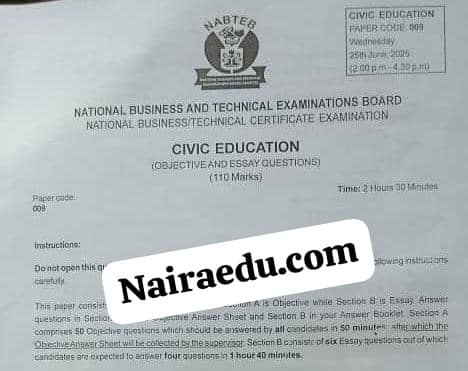NABTEB 2025 Civic Education Questions And Answers
CIVIC EDUCATION
01-10: DCDDCBDCAB
11-20: ABCCABAAAC
21-30: CADCABBBCD
31-40: DBADCDDADB
41-50: ABBCACCCAC
COMPLETED
INSTRUCTIONS: ANSWER FOUR QUESTIONS ONLY WITH AT LEAST ONE QUESTION FROM EACH PART.
PART I
(1a)
Youth empowerment is the process of equipping young people with the necessary skills, knowledge, and opportunities to make informed decisions, take responsibility for their lives, and contribute positively to their communities and society at large.
(1b)
(i) Reduction in crime rate: Empowered youths are meaningfully engaged and less likely to engage in criminal activities such as theft, drug abuse, or cultism.
(ii) Economic development: When youths are empowered with entrepreneurial skills and education, they can start businesses, gain employment, and contribute to the economic growth of the nation.
(iii) Leadership development: Empowered youths are better prepared to take up leadership roles and participate in governance, policy-making, and social development projects.
(1c)
(i) Increase in crime and insecurity: When youths are unemployed, they may resort to crimes such as robbery, kidnapping, or internet fraud to survive, leading to a rise in social insecurity.
(ii) Drug and substance abuse: Many unemployed youths fall into depression and hopelessness, making them vulnerable to drug and alcohol abuse as a form of escape from reality.
(iii) Political thuggery and violence: Politicians often exploit unemployed youths by recruiting them for violent activities during elections, such as ballot box snatching, intimidation, and assaults.
(iv) Mental health issues: Prolonged unemployment can lead to low self-esteem, anxiety, and depression among youths, which affects their mental well-being and overall productivity.
(v) Social unrest and protests: When large numbers of youths remain unemployed, frustration may lead to riots, protests, and social instability, as they demand government action and reforms.
(vi) Increased dependency ratio: Unemployed youths depend on their families or the government for basic needs, putting economic pressure on society and reducing the overall productivity of the population.
===========================
(2a)
Cultism is the practice or system of belonging to a secret group or society that often engages in illegal, violent, or antisocial activities, usually within institutions like schools or communities. These groups usually have strict rules, oaths, and rituals, and members are expected to show blind loyalty to the group.
(2b)
(i) Peer pressure: Many youths join cult groups due to the influence of friends or classmates who are already members. The desire to feel accepted or to avoid rejection often pushes them into joining, even without understanding the consequences.
(ii) Search for protection: In some environments, especially in schools or violent communities, students and young people join cults to seek protection from bullies, rival groups, or other perceived threats. Cults promise safety in numbers and a sense of power, which attracts vulnerable individuals.
(iii) Quest for power and recognition: Some youths join cults because they believe it will give them social status, fear-based respect, or influence over others. Cult groups often promise access to wealth, popularity, and privileges, which are appealing to ambitious but misguided individuals.
(iv) Poor parental upbringing and broken homes: Children who grow up without proper guidance, supervision, or love from their parents are more likely to be lured into cultism. Lack of moral values, neglect, and emotional instability at home can drive young people to seek belonging and identity in dangerous groups.
===========================
*PART II*
(3a)
Citizenship Education is the process of teaching individuals, especially young people, about their rights, responsibilities, and roles as members of a society. It aims to develop informed, responsible, and active citizens who understand the laws, values, and systems that govern their nation and are willing to participate in civic and national development.
(3b)
(i) Obedience to laws: Every citizen is expected to obey the laws and regulations of their community and the country at large. This includes respecting traffic rules, paying taxes, and avoiding criminal acts. Law-abiding citizens help maintain peace and order in society.
(ii) Participation in community service: Citizens have a duty to contribute to the development of their communities by engaging in voluntary services such as environmental sanitation, assisting during emergencies, or supporting local development projects. These actions improve the quality of life and strengthen communal bonds.
(iii) Respect for others and public property: Citizens must show respect to fellow members of the community regardless of age, religion, or background. They must also protect and avoid damaging public facilities such as roads, schools, and hospitals. This helps preserve resources for the common good.
(iv) Promotion of unity and peaceful coexistence: It is the responsibility of every citizen to promote peace, avoid spreading hatred, and resolve conflicts through dialogue. By fostering understanding and tolerance, citizens contribute to a stable and harmonious society.
===========================
(4a)
Inter-communal relationships are the interaction, cooperation, and peaceful coexistence between different communities or ethnic groups within a country. It involves mutual respect, cultural exchange, economic collaboration, and the willingness to live and work together in harmony despite differences.
(4b)
(i) Promotion of peace and unity: Inter-communal relationship, encourages people from different backgrounds to live together peacefully, reducing the chances of conflict, violence, and hatred. It helps to unite diverse communities toward common national goals.
(ii) Economic development: When communities interact and collaborate, they can share resources, trade goods and services, and work together on development projects. This leads to job creation, infrastructure growth, and improved standards of living for everyone involved.
(iii) Cultural understanding and tolerance: Through inter-communal relationships, people learn to appreciate and respect other cultures, traditions, and beliefs. This helps eliminate stereotypes and prejudices, fostering an inclusive and tolerant society.
(4c)
(i) Dialogue and negotiation: Open and honest dialogue between community leaders and members allows issues to be discussed peacefully. Negotiation helps all parties to reach fair agreements without resorting to violence. This approach builds trust and mutual understanding.
(ii) Mediation: Mediation involves the use of a neutral third party to help resolve disputes between conflicting communities. The mediator listens to both sides, identifies the root of the problem, and guides them toward a peaceful resolution. This skill is vital in settling disputes without bias or aggression.
===========================
*PART III*
(5a)
NAFDAC stands for the National Agency for Food and Drug Administration and Control. It is a government agency in Nigeria responsible for regulating and controlling the manufacture, importation, exportation, distribution, advertisement, sale, and use of food, drugs, cosmetics, medical devices, packaged water, and chemicals to ensure they are safe for public consumption.
(5b)
(i) Regulation and registration of products: NAFDAC ensures that all food, drugs, cosmetics, and related products are properly tested and approved before they are sold to the public. The agency registers only products that meet safety and quality standards to protect public health.
(ii) Inspection of manufacturing facilities: NAFDAC conducts regular inspections of factories and production sites to ensure they maintain proper hygiene and production practices. This helps to prevent the production of substandard or harmful products.
(iii) Public awareness and education: NAFDAC organizes campaigns and sensitization programs to educate the public on the dangers of fake drugs, expired products, and unsafe food items. These efforts help consumers make informed choices and avoid health risks.
(iv) Seizure and destruction of fake or harmful products: NAFDAC actively monitors markets and warehouses to identify and confiscate counterfeit, expired, or unapproved products. These are then destroyed to prevent them from reaching consumers, thereby safeguarding public health.
===========================
ALSO READ:
Write A Letter To Another Friend Of Yours Explaining In Detail What Happened
NABTEB Literature 2025 Questions And Answers Expo
NABTEB General Metal Work 2025 Questions And Answers
(6a)
Popular participation is the active involvement of citizens in the political, economic, and social activities of their country, especially in the decision-making process. It includes voting in elections, attending community meetings, joining political parties, contributing to public debates, and holding leaders accountable.
(6b)
(i) Political apathy
(ii) Fear of political violence
(iii) Lack of political education
(iv) Electoral malpractice and lack of trust in the system
(6c)
(i) Political apathy: Many citizens feel indifferent or uninterested in political matters because they believe their involvement will not make a difference. This lack of interest often results from disappointment with past leaders or governance failures, leading them to ignore political activities altogether.
(ii) Fear of political violence: In some areas, politics is associated with violence, thuggery, or intimidation. This discourages people, especially women and the elderly, from participating due to concerns for their personal safety during campaigns, elections, or political gatherings.
(iii) Lack of political education: A large number of people do not understand how the political system works or the importance of their civic responsibilities. Without proper political education, they are unaware of their rights or how to influence governance, which leads to low participation.
(iv) Electoral malpractice and lack of trust in the system: When elections are rigged or manipulated, and corrupt practices go unpunished, people lose faith in the political system. This discourages them from voting or getting involved, as they believe their voices or votes will not count.
===========================
COMPLETED

Mr. Femi is an education blogger who simplifies exam updates and study tips for Nigerian students. His goal is to make learning smart, easy, and rewarding.


2 thoughts on “NABTEB 2025 Civic Education Questions And Answers”